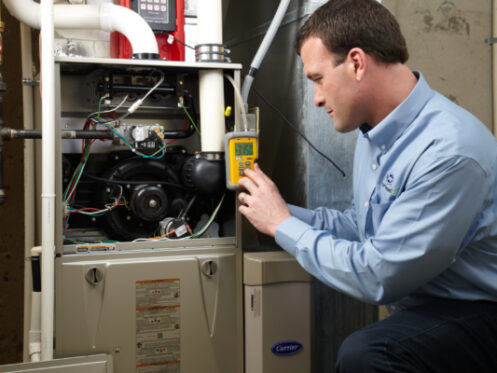A whole home performance analysis is a complete test of your home’s systems, including your HVAC systems. Technicians will check your wiring, inspect your heating and cooling units, assess damage to old or broken components, and recommend changes based on your current energy consumption. They might also assess the potential for things like installing solar panels or fitting better insulation behind the walls.
There are many advantages to undergoing a whole home performance analysis, especially if you’re moving into a new place. However, homeowners of all types can benefit from these thorough and knowledgeable inspections. If you’re curious about whole home performance analyses and how they can help, here are just a few of the advantages that you can reap from its investigation.
Catching Small Problems
Many big and expensive problems didn’t start out catastrophic. Instead, they were small issues that snowballed into bigger ones because they went unnoticed until they started doing serious damage to the home.
A dirty filter, for example, is a minor fix for most air conditioners. But if it remains unchanged for long time, it can start to create a real blockade in airflow. It can reduce your indoor air quality by leaking dust and other contaminates. Most notably, it can cause your air conditioner to work twice as hard as usual to perform half as well, which you’ll soon see reflected in your monthly bill.
There are many other electric, water, and HVAC problems that have a similar potential to go from bad to worse. Your furnace can stop venting its heat properly and create a buildup of gas. Your pipes can drip and drip until they’ve caused water damage to your drywall.
A whole home performance analysis isn’t a luxury; it’s a necessity. It’s a thorough survey of the systems that keep your house a comfortable place to live, and it’ll bring to your attention any issues that threaten that comfort.
Examining the Entirety of Your Home
You’ve probably performed spot checks on your household appliances as the need arises. However, when was the last time that you went to the trouble of a deep and comprehensive inspection? Here are just a few of the tasks that technicians might complete during a whole home performance analysis:
- Inspecting furnaces and air conditioners
- Checking insulation
- Reviewing indoor air quality
- Analyzing electrical panels
- Testing safety features
- Looking for leaks and drafts
- Evaluating the feasibility of things like solar panels
- Ensuring that all elements are up to code
Technicians usually test for things like quality, durability, effectiveness, and ease of operation. As they perform their checks, they’ll note flaws, brainstorm fixes, and make assessment about potential changes for the future. Some will even ask to look at your energy bills to help you create a customized repair or renovation plan for the future. This is what separates an analysis from a simple inspection. It doesn’t just point out flaws; it also offers solutions.
Preparation to Buy or Sell a Home
Are you buying a new house? A whole home performance analysis can make sure that everything is move-in ready. You can test all of the necessary components of your heating and cooling systems to ensure that nothing needs a last-minute fix before you relocate. Additionally, if you’re still in talks to buy, you can use the results of your analysis to re-open wallets at the negotiating table. A house that needs repairs might be ripe for a better deal.
A whole home performance analysis can also help when you’re selling a house. For starters, it’ll reveal problem areas that need fixing before you can list it. You’ll know which areas to highlight and which areas to avoid in terms of stagings. A comprehensive analysis of your home’s pros and cons will also allow you to be more open, honest, and detailed with potential buyers.
Inspections are always a good idea when you’re buying or selling real estate, but they can be especially advantageous when you go the extra mile with a whole home performance analysis. Not only can they have a real impact on property values, but they can also be used to ensure a quicker and easier moving processes for your family.
Money and Energy Savings
Have your energy bills suddenly gone up? Are rooms too hot or too cold for no apparent reason? Is the thermostat not reading the correct temperature?
These are all signs that something is wrong with your HVAC system, and a whole home performance analysis can reveal where the problems are. Once you’ve diagnosed the source of your troubles, you can fix them, and this will save you both money and energy.
Money-wise, you’ll stop paying for a HVAC system that’s probably overcompensating for old or broken parts. This is a very common reason behind utility bills that suddenly rise without a corresponding increase in use: Some part of your HVAC system is struggling to operate around a problem, so it’s forced to work harder to perform the same function as before.
This is also how energy gets wasted. Energy inefficiency can be a real drain on your bank account, and it’s harmful to the environment as well. A whole home performance analysis can help. Some people even call them “home energy audits” since so many of their findings correlate to the way that electricity is used within your home. By receiving a whole home performance analysis and resolving whatever issues are found during it, you can do your part in eliminating energy wastage.
Planning for the Future
Whole home performance analyses can be great planning tools for repairs, renovations, and buying and selling homes. The most obvious way that they help is by providing a comprehensive breakdown of how your household appliances are doing. If you need to make changes, you’ll know. If there are multiple areas needing your attention, you can prioritize repairs based on your budget and timeline.
Another benefit of a whole home performance analysis is being able to plan for upgrades. Technicians can tell you if your property is suitable for things like solar panels, and if so, you can get the ball rolling on saving and even remodeling for them. The same goes for other structural or technological advancements like redoing your wiring, retrofitting more energy-efficient windows, or switching to tankless water heaters.
All in all, a whole home performance analysis can be the first step in planning for a new or upgraded home. Once you’ve figured out the foundation of things, you can start building on it.
Getting Started With a Whole Home Performance Analysis
Part of home ownership is maintaining your systems, including your HVAC systems, and staying on top of potential issues before small problems snowball into larger ones. If you’re interested in scheduling a whole home performance analysis for your Vacaville, California home, contact us today at Cozy Home Services. We can test your furnace, inspect your air conditioner, review your potential for upgrades, and give you all kinds of information on solar energy, insulation, and more.



